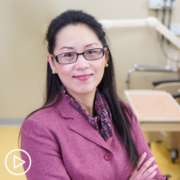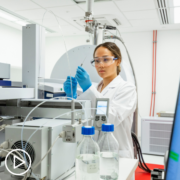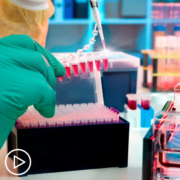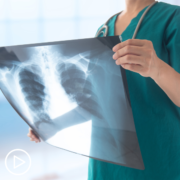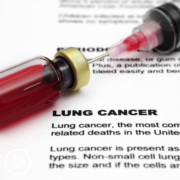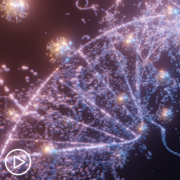What Biomarkers Affect Lung Cancer Care and Treatment?
What Biomarkers Affect Lung Cancer Care and Treatment? from Patient Empowerment Network on Vimeo.
Lung cancer driver mutations can have an impact on therapy choices for patients. Dr. Grace Dy discusses the various lung cancer driver mutations and how treatment options may target specific markers.
Dr. Grace Dy is Chief of Thoracic Oncology and Professor of Oncology in the Department of Medicine at Roswell Park Comprehensive Cancer Center in Buffalo, New York. Learn more about Dr. Grace Dy.
See More From INSIST! Lung Cancer
Related Resources:
Transcript:
Katherine Banwell:
How does testing impact treatment and care?
Dr. Grace Dy:
So, back in like maybe more than two decades ago, I was still in school. The treatment paradigm is sort of like a one size fits all. You come in with a lung cancer diagnosis. Everybody gets treated the same.
But with advancements in technology and understanding of actually what we call lung cancer is really genetically very different from one patient to another. We are actually not even still able to tease out all the particular details, but there are some improvements that have been made along the way. And so, defining, for example, mutations in cancers, there are what we call driver mutations that have a matched targeted therapy.
In certain patients, actually the target therapy works so much better than chemotherapy, for example. And that’s why we have it in guidelines based on the results of clinical trials showing that in the appropriate setting, if you have a mutation that we discovered through molecular testing, and then you use the matched target therapy, survival is so much better compared to, for example, chemotherapy.
Same with immunotherapy. If we use a biomarker to test out which patients may actually respond well to immunotherapy alone – so, that’s a major treatment paradigm change within the less than 10 years wherein we define there’s a group of patients where that’s all they need. Non-chemo, just immunotherapy, and they will do well.
Katherine Banwell:
What are some of the mutations that are being targeted?
Dr. Grace Dy:
Right. So, it seems like every year, it’s growing. So, it started off with the poster child in lung cancer story of EGFR. So, we have EGFR mutations. Even EGFR mutations, they’re a subtype of mutations for – there are certain drugs that work better for certain mutations.
So, we have the classical EGFR mutations, the atypical EGFR mutations. But EGFR mutations as a group are probably the most characterized given the longevity of the research that has been done. But there’s a lot more.
So, for example, ALK, KRAS, BRAF, HER2, NTFK, NRG, RET, MET. Even those mutations, they’re all these new ones. It’s between the subtype of mutations. For example, we talked about EGFR. Same thing with MET. You have MET exon 14 skip mutations. But in the absence of MET skip mutations, there are also what we call MET gene amplification, MET protein over-expression that have matching therapies that may actually work better.
But we’re still kind of scratching the surface. There’s a whole lot more being characterized and developed. Case in point, just a little over a year ago, there’s an LTK Fusion that was described. Very rare. But there’s a target therapy for it. So, unless you test it, you won’t find a matching targeted therapy.

